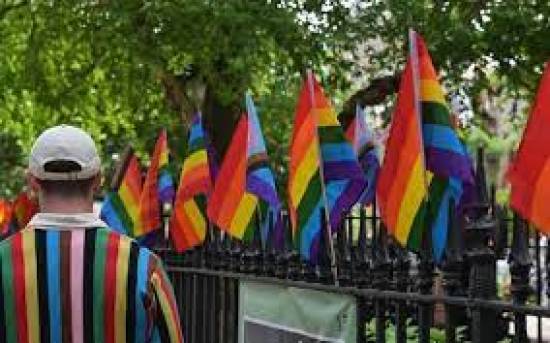A person wearing a sweater with 'Progress Pride Flag' colors, including rainbow and black and brown stripes for communities of color, walks past rainbow flags at the Stonewall National Monument, the first US national monument dedicated to LGBTQ history and rights, marking the birthplace of the modern lesbian, gay, bisexual, transgender, and queer civil rights movement, on June 1, 2020 in New York City. (Photo by Angela Weiss / AFP) (Photo by ANGELA WEISS/AFP via Getty Images) - Angela Weiss/AFP via Getty ImagesMore
Teachers should drop the terms boys and girls in favour of “learners”, and mix up the sexes in PE classes, Stonewall has told schools.
The controversial LGBT charity is urging teachers to ditch all gendered language and gendered uniforms and suggests that children should compete against the opposite sex in sport.
A series of guidance documents state that uniform policies should "give the option to wear a skirt as well as the option to wear trousers". One of Stonewall’s guides said that its work in primary schools was funded by the Government Equalities Office.
Stonewall advises school staff that they should: “Avoid dividing learners by gender, whether in the classroom (you could divide them by their favourite colour, month of birth or something else) or through uniform, sports activities or other aspects of school life.”
Trans pupils can use the lavatories, changing rooms and dorms on school trips that they feel most comfortable in, another booklet states.
To be a member of the Stonewall School & College Champion schools, establishments have to pay a yearly fee, starting at £150 plus VAT for those with less than 100 pupils, and rising to £800 plus VAT for those with more than 2,000 learners.
St Paul’s, the prestigious private school in London, is reportedly among the hundreds of primary and secondary schools that are members.
Champions are then able to apply for a Bronze, Silver or Gold award to show how well they are following the “best practice”.
Those wishing to win are directed to a guide which tells them that “it is unnecessary to say 'boys and girls' when referring to learners of all genders, you could instead say 'learners'".
They are told that they should check their policies and remove any “unnecessarily gendered language. Instead of using ‘he’/‘she’, you could use ‘they'".
They should also teach primary school children to use “they/them” as a pronoun, it is said.
Tanya Carter, a spokesman for the parents and teachers campaign group Safe Schools Alliance UK, said “It is shocking that cash-strapped schools are paying for misinformation from Stonewall that undermines basic safeguarding.”
She said that sport should be "separated by sex for reasons of safety and fairness", particularly in light of a recent Ofsted report that found sexual harassment was prevalent in schools.
"Single sex sports are important to girls for reasons of privacy and dignity. This is necessary to increase girls’ participation," Ms Carter said. "Girls' participation in sports is essential to both physical and mental health.”
It is unclear what process schools go through to get an award, but an investigation by The Telegraph recently revealed the lengthy process that public bodies and companies go through to be recognised on the charity’s equality leaderboard.
The resources are also used by councils for Stonewall's Children and Young People's Services Programme. Local authorities across England, Scotland and Wales compete for a separate awards scheme requiring 'best practice' in their child provision.
Stonewall’s advice to educators also includes that teachers should not use 'boy, girl, boy, girl' when lining pupils up and ditch phrases such as 'man up' and 'don't be such a girl'.
Gendered language should also be avoided when discussing hair, make-up and piercings, it says.
A Stonewall terminology exercise for children tests them on "transitioning" and "gender dysphoria", a medical term for feeling a mismatch between birth sex and lived gender.
A spokesman for the charity said it was “very proud of all of our work supporting schools to create supportive and inclusive environments which help everyone feel accepted for who they are”.
They added that they are “confident that the advice that we give schools is robust” and “in line with the Department for Education’s guidance for schools in England, and the Equality and Human Rights Commission’s Equality Act Code of Practice”.
A government Equalities Office spokesperson said: "Six organisations were awarded funding to deliver programmes tackling anti-homophobic, biphobic and transphobic bullying in schools across the country. The funding was a one-off payment for 2019-20."/The Telegraph


